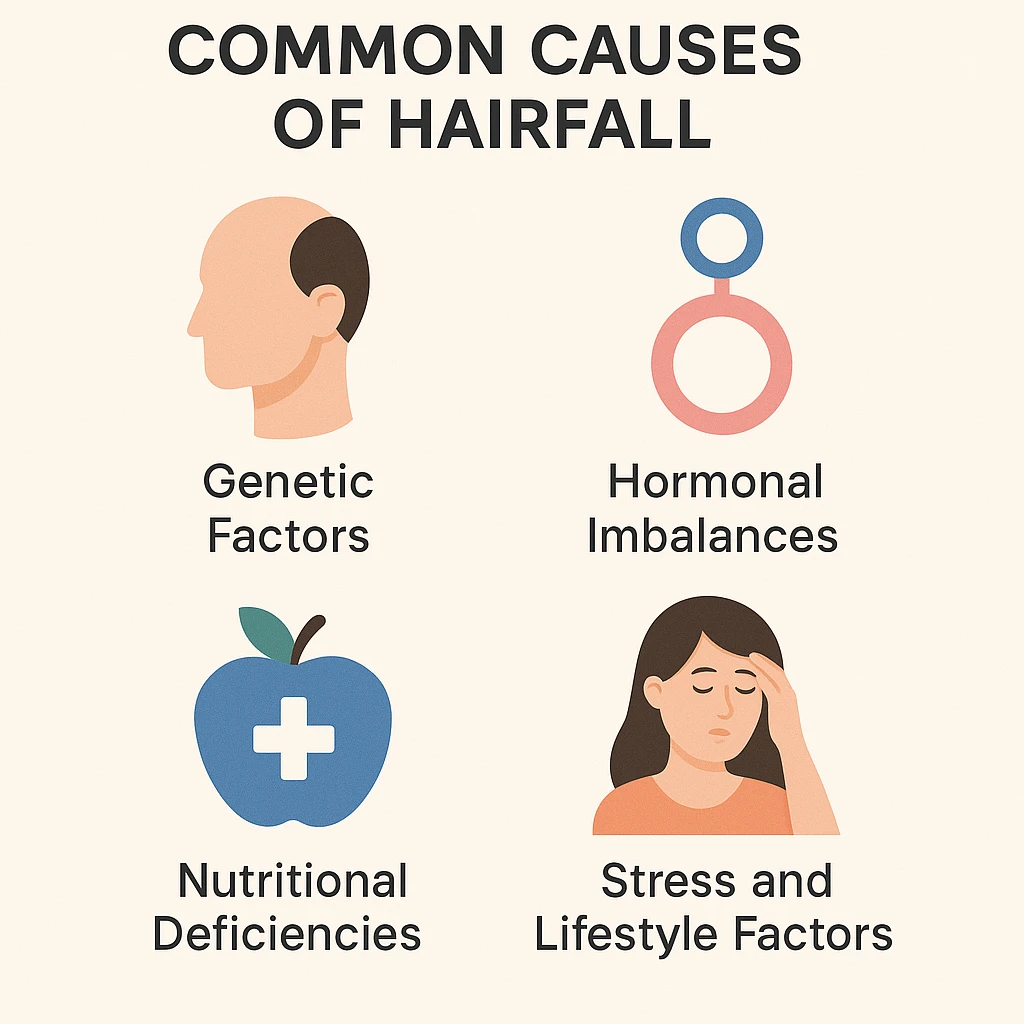Hairfall : Common Causes
Hair fall, also known as hair loss or alopecia, is a common condition that affects people of all ages and genders. While it is normal to shed 50 to 100 hairs daily, excessive hair loss may indicate an underlying issue. Understanding the causes of hair fall is essential for effective treatment and prevention. The most common causes can be broadly classified into genetic, hormonal, nutritional, lifestyle, and medical factors.
1. Genetic Factors:
One of the leading causes of hair fall is a hereditary condition known as androgenetic alopecia, commonly referred to as male or female pattern baldness. This form of hair loss occurs gradually and follows predictable patterns — a receding hairline and bald spots in men, and thinning hair along the crown in women. It is influenced by genes inherited from either parent and is often triggered by hormonal changes, especially androgens (male hormones).
2. Hormonal Imbalances:
Hormones play a significant role in regulating the hair growth cycle. Imbalances, such as those seen during pregnancy, childbirth, menopause, or thyroid dysfunction, can cause temporary or long-term hair loss. For instance, hypothyroidism and hyperthyroidism can disrupt the hair growth cycle, leading to thinning hair. Polycystic ovary syndrome (PCOS) is another hormonal disorder that can result in hair thinning in women.
3. Nutritional Deficiencies:
A lack of essential nutrients can significantly impact hair health. Deficiencies in iron, protein, vitamin D, vitamin B12, zinc, and biotin are commonly associated with hair loss. Iron-deficiency anemia, particularly in women, is a well-known contributor to hair fall. A poor diet, crash dieting, or eating disorders can also deprive the hair follicles of the nutrients necessary for growth and maintenance.
4. Stress and Lifestyle Factors:
Physical or emotional stress can push hair into the resting (telogen) phase, leading to a condition called telogen effluvium, where hair sheds more rapidly than usual. Major life events such as surgery, illness, trauma, or psychological stress can trigger this type of hair loss. Additionally, poor sleep, lack of exercise, smoking, and excessive alcohol consumption can negatively impact hair health.
5. Medical Conditions and Medications:
Several medical conditions can lead to hair loss, including autoimmune diseases like alopecia areata, which causes patchy hair loss as the immune system attacks hair follicles. Chronic illnesses such as lupus and diabetes can also contribute. Certain medications used for cancer (chemotherapy), arthritis, depression, heart problems, and high blood pressure may cause hair thinning or loss as a side effect.
6. Hair Care Practices and Styling:
Excessive use of chemical treatments, heat styling tools, and tight hairstyles (such as ponytails or braids) can damage the hair shaft and lead to a condition called traction alopecia. Over-washing, rough brushing, and use of harsh shampoos can also weaken the hair and cause it to fall out.
In summary, hair fall can result from a combination of genetic, hormonal, nutritional, lifestyle, and medical factors. Identifying the underlying cause is key to effective treatment and prevention. Consulting a healthcare professional or dermatologist can help diagnose the issue and guide appropriate interventions.

Related Blog
What Causes Oily Skin and Can It Be Managed Naturally? Exploring Root Causes and Gentle Solutions
Aug 2, 2025 by Admin
General
What Are the Signs That You Have Sensitive Skin? Key Symptoms to Help You Identify This Delicate Skin Type
Aug 1, 2025 by Admin
General